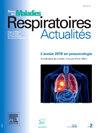Algorithme thérapeutique des cancers bronchiques non à petites cellules avec fusion ALK, ROSI et RET
Q4 Medicine
引用次数: 0
Abstract
ALK (3-7%), ROS1 (1-2%), and RET (1-2%) rearrangements differ epidemiologically from other non-small cell lung cancers. They are more frequently observed in younger patients, light or never smokers, and are predominantly associated with adenocarcinoma histology. Several fusion partners have been identified for each of these genes, with some partners shared across targets. Identifying these genomic alterations at the time of initial diagnosis in advanced non-small cell lung cancer patients is essential to guide first-line treatment decisions, direct patients toward effective targeted therapies, and avoid ineffective strategies such as immune checkpoint inhibitors in monotherapy or potentially toxic treatment sequences. In patients with ALK rearrangements, lorlatinib is the first-line standard, with a 5-year progression-free survival (PFS) rate of 60% and remarkable intracranial efficacy. Post-lorlatinib resistance mechanisms in first-line therapy appear to be ALK-independent, and chemotherapy currently remains the standard second-line option. In patients previously treated with brigatinib or alectinib, secondline therapy should be guided by the identification of resistance mechanisms. Neladalkib, a fourth-generation ALK inhibitor, is currently available through an early access program. For ROSI-rearranged non-small cell lung cancers, crizotinib is the only approved targeted therapy to date, although agents such as taletrectinib and zidesamtinib (also available through early access) show promising activity. Finally, for RET-rearranged non-small cell lung cancers, selpercatinib is now the standard of care from the first-line setting, offering significant clinical benefit.
ALK、ROSI、RET融合治疗非小细胞肺癌的算法
ALK(3-7%)、ROS1(1-2%)和RET(1-2%)重排在流行病学上与其他非小细胞肺癌不同。它们更常见于年轻患者,轻度或从不吸烟,并且主要与腺癌组织学相关。这些基因的几个融合伴侣已经被确定,其中一些伴侣在目标中共享。在晚期非小细胞肺癌患者的初始诊断时识别这些基因组改变对于指导一线治疗决策,指导患者进行有效的靶向治疗,避免无效的策略,如单药治疗中的免疫检查点抑制剂或潜在毒性治疗序列至关重要。在ALK重排患者中,lorlatinib是一线标准,5年无进展生存(PFS)率为60%,颅内疗效显著。一线治疗的氯拉替尼耐药机制似乎与alk无关,化疗目前仍是标准的二线选择。在先前接受布加替尼或阿勒替尼治疗的患者中,二线治疗应以确定耐药机制为指导。Neladalkib是第四代ALK抑制剂,目前通过早期准入项目可获得。对于rossi重排的非小细胞肺癌,尽管taletrectinib和zidesamtinib(也可通过早期获得)等药物显示出有希望的活性,但迄今为止,克唑替尼是唯一被批准的靶向治疗药物。最后,对于ret重排的非小细胞肺癌,selpercatinib现在是从一线开始的标准治疗,提供了显着的临床益处。
本文章由计算机程序翻译,如有差异,请以英文原文为准。
求助全文
约1分钟内获得全文
求助全文
来源期刊

Revue des Maladies Respiratoires Actualites
Medicine-Pulmonary and Respiratory Medicine
CiteScore
0.10
自引率
0.00%
发文量
671
 求助内容:
求助内容: 应助结果提醒方式:
应助结果提醒方式:


